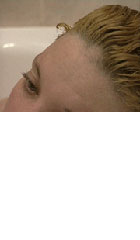
Purity 2002
Distributed by Women Make Movies, 462 Broadway, New York, NY 10013; 212-925-0606
Produced by Anit Breuer
Directed by Anat Zuria
VHS, color, 63 min.
College - Adult
Women's Studies, Jewish Studies
Date Entered: 11/09/2018
Reviewed by Maureen Puffer-Rothenberg, Valdosta State University, Valdosta, GAAnat Zuria’s documentary Purity examines the Orthodox Jewish tradition of immersion in the miqveh, a ritual bath designed to purify a woman after her menstrual period. Jewish law (Halachot) prohibits even the slightest physical contact between husband and wife during her menstruation and for seven days afterwards, until she performs the ritual bath; otherwise she is “unpure” and must not be touched. Zuria’s film examines her own experience and that of several modern Israeli women who view the miqveh variously as a cherished tradition, a functional obligation, or a meaningless, even demeaning, religious practice.
As the film opens, Zuria arrives at her uninviting neighborhood miqveh. The camera follows her into a building resembling a doctor’s office, lingering on details of the miqveh chamber-- the steps into the bath look slippery, and the pipes pumping “pure” water into the tiled chamber appear old and worn. Zuria complies with the ancient tradition but obviously finds it humiliating; the miqveh attendant even questions her about whether she has brushed her teeth, washed between her toes or combed her hair.
Zuria’s experience of the miqveh is intercut with comments from other women who are struggling with the requirements of ritual purity. Her primary subjects are Natalie, whose husband of eight years divorced her because she stopped performing the ritual miqveh bath; Shira, a bride-to-be whose mother is teaching her about the miqveh; and Katy, who has somewhat modified her observation of purity but suffers from menstrual irregularities and is still constrained by Halachot.
Zuria’s intimate style lends great depth and richness to the film; her close shots of the women’s faces are as eloquent as their speech. Even subjects who appear only briefly are given these evocative close-ups. Zuria’s camera seeks out details that highlight the woman’s perspective-- dishwater swirls down a drain; a religious advisor smiles beneath an elaborate hat; Shira folds her fiancé’s clothes as he looks on; Katy’s daughter makes a cup of tea.
The soundtrack is primarily in Hebrew, subtitled in English. While the subtitles contain several misspellings of English words, this is a minor flaw relative to the overall impact and beauty of the film.
Purity deals frankly with sexual matters and menstruation and is appropriate for mature groups, particularly college classes in Jewish and women’s studies or those interested in women’s issues in the Orthodox Jewish community.
Awards:
- Jerusalem International Film Festival, Mayor Award for Best Documentary Film
- Golden FIPA Award in Creative Documentary